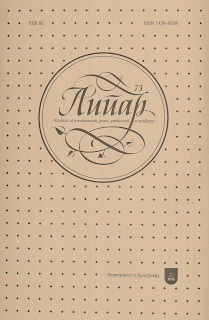АКАДЕМСКИ ВОКАБУЛАР: ДА ЛИ СУ СТУДЕНТИ (У)ОПШТЕ ОБРАЗОВАНИ? О ПОТРЕБИ ЗА УКЉУЧИВАЊЕМ АКАДЕМСКОГ ВОКАБУЛАРА У КУРИКУЛУМЕ ЗА СРПСКИ ЈЕЗИК У СРЕДЊОЈ ШКОЛИ И НА УНИВЕРЗИТЕТУ
ACADEMIC VOCABULARY: DO STUDENTS HAVE A PROPER EDUCATION? ABOUT THE NECESSITY OF INCLUDING ACADEMIC VOCABULARY IN SERBIAN LANGUAGE CURRICULA IN HIGH-SCHOOL AND UNIVERSITY EDUCATION
Author(s): Jovana Z. MilovanovićSubject(s): Social Sciences, Language studies, Language and Literature Studies, Education, Applied Linguistics, Sociology, Sociolinguistics, Descriptive linguistics, South Slavic Languages, School education, Higher Education , State/Government and Education, Social development, Sociology of Culture, Philology, Sociology of Education, Pedagogy
Published by: Универзитет у Крагујевцу
Keywords: Serbian language;academic vocabulary;academic competence;general culture
Summary/Abstract: This article discusses reception and production of academic vocabulary among native speakers of Serbian language. Academic vocabulary is one of the key elements of academic language competence, and a modest lexicon and underdevel- oped academic language competence can cause problems in both comprehension and production. In this research, we used a vocabulary test consisting of 12 items taken from general culture entrance exams used at the Faculty of Philosophy, University of Belgrade. The participants are BA students of French language at the Faculty of Philology, University of Belgrade, years 1-4. The participants were instructed to provide a synonym or a definition for each item, as well as a sentence containing the given word. The aim of this research is to highlight issues in comprehension of academic vocabulary and establish the influence of factors such as word etymology or university level on the success of the participants. We analysed the results and classified them in three categories: correct, incorrect and unanswered. The majority of participants successfully identified just half of the given words (in order of success: poliglota 95,76%, bestseler 92,37%, pacifista 66,10%, suveren 58,47%, prototip 57,63%, elokventan 56,78%). The success level for the other half of the items from the test was below 50% (in order of success: erudita 49,15%, hipokrizija 39,83%, nepotizam 22,03%, skrupulozan 18,64%, šprahfeler 10,17%, eksproprijacija 8,47%). The influ- ence of etymology was analysed through a comparison of the results for six items of French/Latin origin with the results for the other six items which did not originate from Romance languages. This analysis shows that the participants had similar re- sults in both groups of items, with three words from each group having above 50% of correct answers (suveren, elokventan, pacifista; poliglota, bestseler, prototip). Lastly, we examined success levels from year 1, year 2, year 3 and year 4 students and de- termined that the median of correct answers for each year does vary, but that there is no strong linear progression (median year 1=5, year 2=6, year 3=7, year 4=6). The results indicate a lack of knowledge of academic vocabulary and difficulties in identifying and manipulating this type of lexis. We believe it is necessary to integrate academic language skills, including academic vocabulary, in high school curriculum and introduce Serbian language as a subject at university level.
Journal: Липар - часопис за књижевност, језик, уметност и културу
- Issue Year: XXI/2020
- Issue No: 73
- Page Range: 203-216
- Page Count: 14
- Language: Serbian

